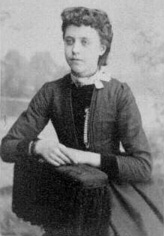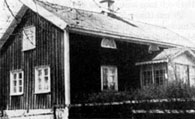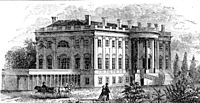
Swedenroots - Genealogy for you
Jennie Amalia |
My Grandmother's sister who emigrated to the U.S 1891
Godparents were the neighbors Sven Karl Svensson, August Johansson and their wives. Jennie's father was Johannes Svensson, born May 15, 1825 in Naum, Skaraborgs County and her mother was Johanna Jansdotter, born July 5, 1839 in Hällstad, Älvsborgs County. They were married October 12, 1864 in Borgstena, Älvsborgs County. Jennie had two brothers, Emil, born August 7, 1865 and Johan August, born November 14, 1867. When Jennie was only two years old her mother died of pneumonia April 13, 1876. The next year in November 1877 Johannes married Kristina Wilhelmina Larsdotter. Kristina was born November 19, 1850 in Gällstad, Älvsborgs County. At the time for the marriage she was working as a maid and Johannes was a worker in Borås. Jennie got a half brother, Axel Wilgot in June 11, 1878. In April 28, 1882 Emil Johnson emigrated from Borås to USA. He had been working in a factory to produce yarn. |
The rest of the family moved to Gudmundsgården, Gällstad, Älvsborgs County in May 29, 1885, while Johan August stayed in Borås and worked in a color factory. Jennie got a half sister, Judith, in December 21, 1888. November 8, 1889 Jenny Amalia moved alone to Skogsryd, Torpa parish in Borås. She worked there as maid. Jennie Amalia and her brother Johan August traveled in June 5, 1891 from Gothenburg by boat to England. When they came to England, they were traveling by train to get to the western part of the country. June 10, 1891 they went with a ship from Liverpool in England to the great country USA.
Gudmundsgården
|
Jennie's brother Johan August is my Brick Wall!
The story of Andrew Chilberg´s meeting with President Theodore Roosevelt
Andrew Chilberg emigrated from Sweden April 1883. In Sweden his name was Anders Kilberg. In South Bend, Indiana, Andrew got a job delivering mail. He was proud to have a "working class" job, as he was very idealistic about democracy, brotherhood, trade unions, etc. He very quickly rose to be the most trusted mail man, who delivered the mail to downtown businesses. In those days, there were two mail deliveries a day on that route, and he did them both. He never missed a day of work, except once.
Andrew was a keen follower of politics, socialist in his views, and he got upset about how President President Roosevelt was pushing the project through, but conditions were |
Andrew decided that he needed to talk to Roosevelt in person about this. So he took some time off, which shocked everyone. He rode the train from South Bend, Indiana all the way to Washington DC. There he walked to the White House, and asked to see the president. The guards weren't going to let him in, but at that moment, Teddy Roosevelt stepped into the hall, and asked what was going on. He was interested in what Andrew had to say, and invited him to have lunch with him. They ended up talking together for several hours. Then Andrew traveled back to Indiana again. |
 Jennie Amalia was born in Borås March 12, 1874. She was christened March 14 and the vicar's name was Kjöllerström.
Jennie Amalia was born in Borås March 12, 1874. She was christened March 14 and the vicar's name was Kjöllerström. Gudmundsgården in Gällstad, Västergötland.
Gudmundsgården in Gällstad, Västergötland. Teddy Roosevelt was handling the building of the Panama Canal.
Teddy Roosevelt was handling the building of the Panama Canal. not humane, there was malaria, and the Chinese workers especially were treated terribly.
not humane, there was malaria, and the Chinese workers especially were treated terribly.